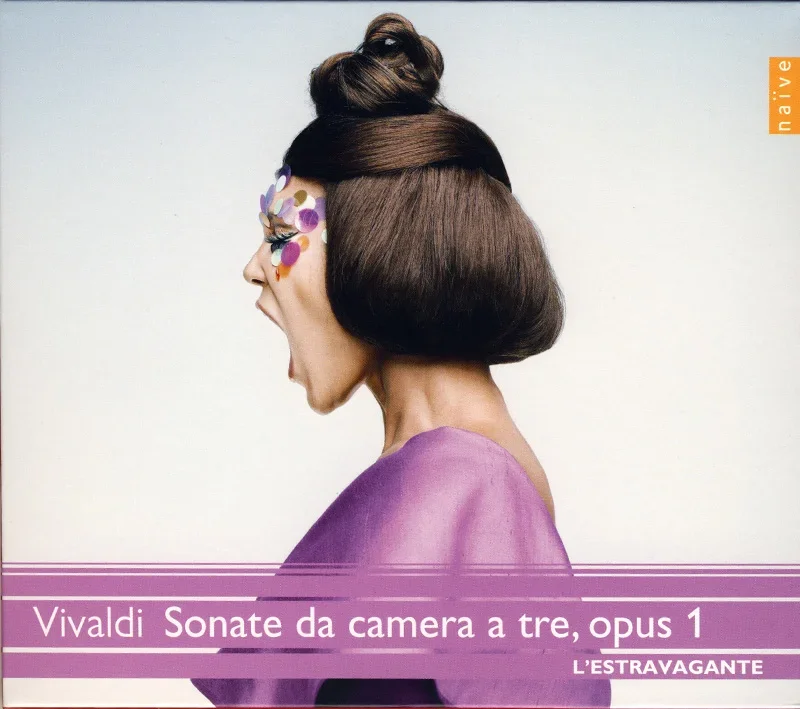 London Baroque's recent recordings have been on the BIS label, and among them for sale in MP3 format is Vivaldi's first opus, a set of trio sonatas. In more than one way, we know that Vivaldi had his sights on the works of Corelli in this set. In many ways, it's a tribute to Corelli, but with that freshness that Vivaldi sometimes brings to his music, and in this case, a younger Vivaldi who had no yet fully developed what we might even call a "Vivaldi style."
London Baroque offers us music beyond the opera prima, with RV 76 and 72 from his opus 5, the Al Santo Sepolcro sonatas RV 169 and RV 130, not to mention an opus 2 trio sonata and a trio concerto (RV 114). It's a very good appraisal of LB's take on Vivaldi as a trio sonata composer.
London Baroque's recent recordings have been on the BIS label, and among them for sale in MP3 format is Vivaldi's first opus, a set of trio sonatas. In more than one way, we know that Vivaldi had his sights on the works of Corelli in this set. In many ways, it's a tribute to Corelli, but with that freshness that Vivaldi sometimes brings to his music, and in this case, a younger Vivaldi who had no yet fully developed what we might even call a "Vivaldi style."
London Baroque offers us music beyond the opera prima, with RV 76 and 72 from his opus 5, the Al Santo Sepolcro sonatas RV 169 and RV 130, not to mention an opus 2 trio sonata and a trio concerto (RV 114). It's a very good appraisal of LB's take on Vivaldi as a trio sonata composer.
The B-minor sonata, RV 79, has that Corellian flavor, here played with a light organ in the continuo. LB employs a harpsichord in other works here, and I always like some variety in the continuo. Unfortunately, we miss out on too much variety, without the plucked bass options that are often found in the latest baroque recordings. Of course, we can also question the authenticity of all those lutes and such, when the composer quite clearly states "Due Violini e Violone o Cembalo." Of course, these titles were also thought to indicate as much marketing as anything else (the case has been made for asking either/or to make them more marketable, but I also question that thinking, as I can't think of too many pieces of baroque music that have such exacting orchestrations). The variety here is organ or harpsichord with cello. The leader of the group is a cellist, so... we might expect that. But in all honesty, I would have enjoyed a departure in at least a few of the sonatas with a solo instrument in the bass (thinking a keyboard or even a deeper string bass instrument.) London Baroque is a good ensemble, but they've always been kind of conservative compared to ensembles from Italy. I am not going to comment a lot about the music here: this isn't Vivaldi's finest work, but that's not to say it isn't good music. Several, like the no. 3 works (RV 61) you might not ever guess was Vivaldi. It's generic, with a lot of passages in thirds for the violins, and the emotional depth of the music is never terribly severe, Vivaldi using very safe harmonic progressions. There is safety too in the more Corellian-opening of no. 4, RV 66, which with its closing cadence utilizing nice long notes in the violins. To me, this screams out for improvisation and some flavor. It might be the "British" aspect of the ensemble (although they all have International training), but this is well-done but a little polite. I feel Vivaldi did a good enough job at offering us some nuggets at which to bite, lines on which to ornament, rhythmic and harmonic pulses for us to exaggerate, perhaps, but it just is played well and politely. I like this recording, and the ensemble does a good and less-safe job with the final work in op. 1, the variations on La Follia. But--and I don't mean to disrespect the musicians--I feel the imagined audience might all have white hair. This image in my mind subscribes to the notion that music is there to be beautiful and never disturbing. And I get the similar sense of vision when I hear folks like Il Giardino Armonico or Accademia Bizantia playing Vivaldi... except, the intended audience isn't made up of all senior citizens. There's surprise in their music, and there's more extremes between dynamics. Compared to this, I've enjoyed LB's playing of Bach's trio sonatas on BIS and their Leclair on Harmonia Mundi. This Vivaldi, despite being well played, and generous beyond his first opus, a little too polite in style.

